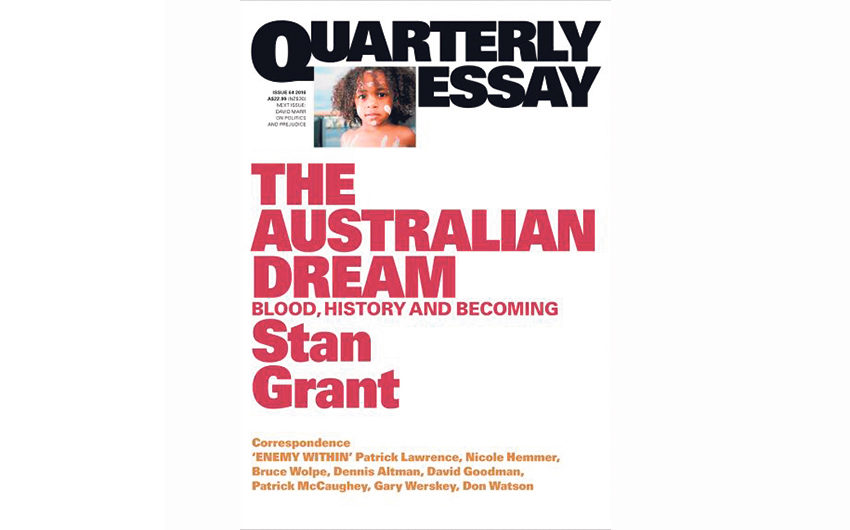Book Review: The Australian Dream: Blood, History and Becoming

At the beginning of 2016, a speech that journalist and broadcaster Stan Grant delivered months earlier went viral.
In the wake of the Adam Goodes booing embarrassment, Grant captured what it meant to be an Indigenous person excluded from the Australian Dream.
As he said in that speech at Sydney’s Recital Hall: “The Australian Dream is rooted in racism. It is the very foundation of the dream. It is there at the birth of the nation … A land for the taking. Sixty thousand years of occupation.”
His brilliant Quarterly Essay expands on that unrehearsed speech that, unexpectedly to him, captured the imagination of the country.

He begins by discussing the aftermath. It exploded when Grant, a Wiradjuri man, was in Washington, reporting on Prime Minister Malcolm Turnbull’s visit, for Sky News. Mike Carlton called it Australia’s Martin Luther King moment on Twitter, but humbly Grant believes the reaction and praise was more than it deserved, an accident of timing that coincided with the upcoming Australia Day.
A year on, with the debate around Fremantle Council proposing to change the date of its Australia Day celebration and a New York Times op-ed on why blackface isn’t taboo in Australia, which has gone viral, Grant, once again, has timing on his side.
Simply, Grant wants to answer a question: is he Australian? By tracking his family, including his great great grandfather Frank Foster, he encapsulates what it was like for Indigenous Australians to be migrants on their own land.
“We did not seek a haven in this new country,” Grant writes.
“It was often violently forced upon us. This nation’s wealth was built on our land – land we were driven from”. Grant’s Quarterly Essay isn’t a “litany of horrors” as he and other have told that story, instead the ABC’s new Indigenous Affairs editor confronts whether he and
others have “perpetrated a lazy narrative that obscures a more complete story of the dynamism and potential of Australia and its first people”.
He writes about Aboriginal pioneers, who like other migrants, wanted a better life for their children. As a child Grant and his family, like other migrants, picked fruit: “we were pickers: migrant workers.”
Grant also captures the emerging Indigenous middle class and what this means for Australia. He discusses his love for all things British, especially music: “can an Aborigine be a Smiths fan? I can be whatever I damn well like.”
He is a product as much of the Enlightenment as the Dreaming and he wants to take his skills to the market place, not his identity. He writes that Indigenous people are making their mark in Australian society: there are 30,000 Indigenous university graduates (there were fewer than 4000 25 years ago, and 219 Indigenous students were awarded with PhDs between 2000 and 2011. He quotes Marcia Langton who says the Indigenous middle class is a “quiet revolution.”
This is a revolution that should be recognised and Grant’s must-read essay is the place to start.
Author: Stan Grant
Publisher: Quarterly Essay (Black Inc)